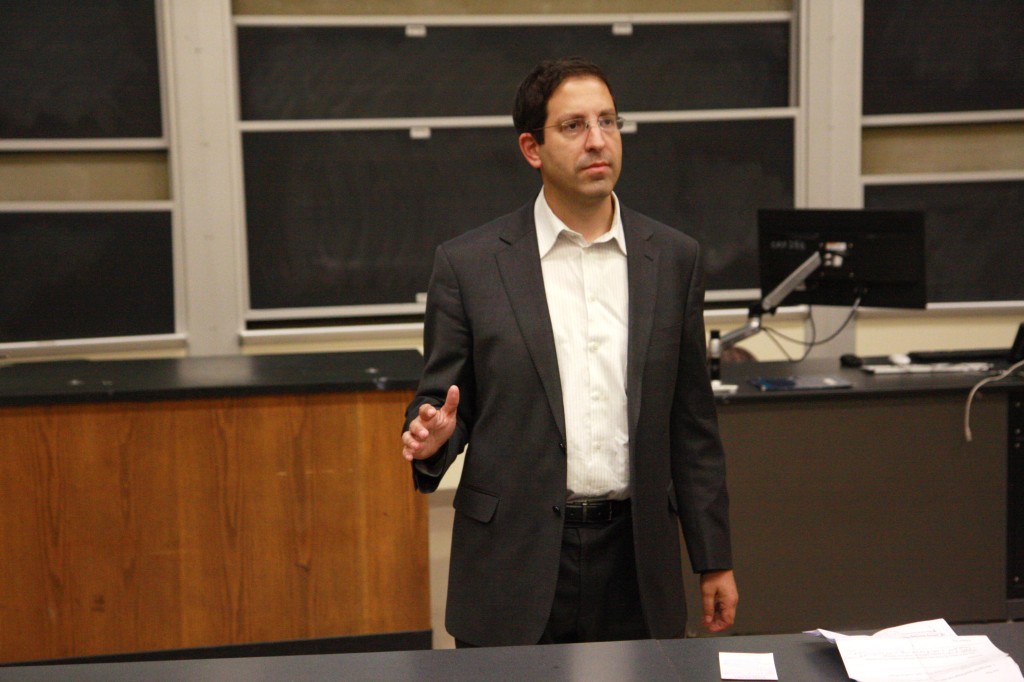
Introducing himself as a lecturer who prefers to discuss the positives rather than the negatives, chief political correspondent and analyst for The Jerusalem Post Gil Hoffman discussed the relationship between the U.S. and Israel as well as the ongoing peace talks between the Israeli government and Palestinian leadership.
During Monday night’s talk titled “Red States, Blue States and the Jewish State: An Insider’s Perspective from Jerusalem on Netanyahu and Obama,” Hoffman addressed both positive and negative developments going on in Israel. Hoffman currently resides in Jerusalem with his wife and two children.
Hoffman discussed a wide range of issues affecting Israel at the moment, both internationally and internally, which included tensions in the Middle East, the Israeli-Palestinian conflict and relations with the United States.
“Being Israeli is about hoping for the best and preparing for the worst,” Hoffman said. “And that’s why Israel has to be getting ready just in case in both offense and defense.”
He began with his concern regarding Iran’s pursuit of nuclear weapons, saying that he believed the world has not imposed serious enough measures on Iran, which left Israel in danger.
“The warheads have become a lot more advanced and a lot more dangerous, so they’ve gone up both in quality and quantity,” Hoffman said. “In Israel they’re very worried about Iran.”
Also of concern in the Middle East, according to Hoffman, is the war in Syria between government and revolutionaries, where Israel has sent many soldiers.
Hoffman discussed the Gaza Strip and the Israeli-Palestinian conflict and its resulting attacks on Israel. According to Hoffman, the attacks are happening in three different ways: “over, back and under.” Missiles go over the fence between Gaza and Israel, through the fence, and underground via tunnels, Hoffman said.
Hoffman spoke on the boycotts, divestment and sanctions which countries have imposed on Iran as punishment for its nuclear policy, which he said have left Iran reeling.
“Iran lost from the sanctions that Israel persuaded the world to put on, $160 billion in two years, and that’s what led them to make compromises,” Hoffman said. “That’s what made the Iranians come to the negotiating table at all and made very serious concessions.”
He also said that keeping settlements out of the talks was a good move because they have proven to be a controversial issue.
“If you don’t put [settlements] front and center it allows more to get done according to both the Israelis and Palestinians,” Hoffman said.
In regards to the Israeli army and the fighting that has been occurring in Syria, Hoffman said that Israel has to be getting ready on both offense and defense. He acknowledged the support Israel has received from the United States, saying that the U.S. has been providing Israel with state-of-the-art planes and helicopters before any other country in the world.
Speaking further on American involvement, Hoffman said that Secretary of State John Kerry has learned a lot in his involvement with Israel.
“John Kerry came to Israel 11 times in the first six months as Secretary of State … to make sure the Israelis and Palestinians would be taken care of seriously,” Hoffman said. “Kerry decided to keep the talks very discrete, which was the key to their success.”
The event was hosted by Binghamton University Zionist Organization (BUZO), Hasbara and Bearcats for Israel.


